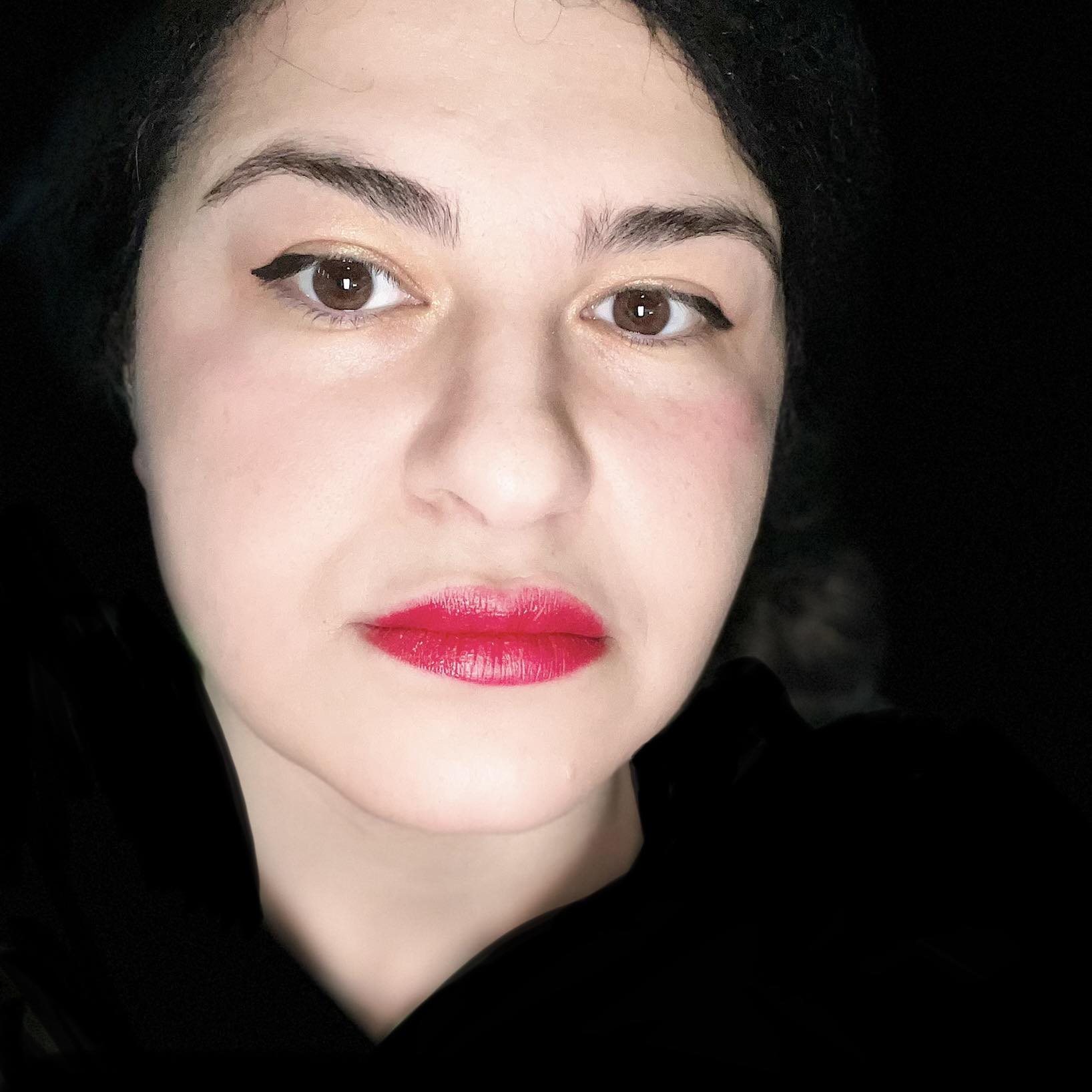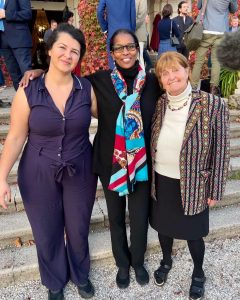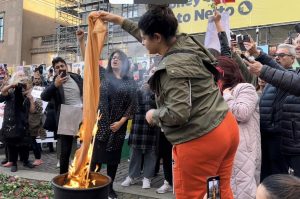“[We in the CLARITy Coalition] know the totalitarianism and tyranny of Islamists and recognize the need to oppose them full-heartedly.” Jaleh Tavakoli on attending the CLARITy conference and being the first non-founding member to join the coalition.

Published 6/29/2023
Jaleh Tavakoli is an Iranian/Danish ex-Muslim dissident. Her family fled the Islamist tyranny of Iran when she was a child, and she has devoted her life ever since to combating the threat Islamists pose to free and open democratic societies.
She attended the first-ever conference of the CLARITy (Champions for Liberty Against the Reality of Islamist Tyranny) Coalition last October in Salzburg, Austria. After the conference, she became the first non-founding member to join the coalition.
We caught up with her more than half a year after the conference to hear her story and get her insights on Islamists and how to oppose them.
AHA Foundation: Thank you for speaking with us today, Jaleh. To start, tell us a little about your personal background.
Jaleh Tavakoli: Thank you. I was born in Iran during the Iran-Iraq War. My father fled Iran when I was young because of his political activism against the regime—he feared for his life. I grew up in Iran while the Islamist regime solidified its political power and introduced restrictions on everyone’s social lives. When I was nine, my mom, brother, and I left Iran for Denmark to be reunited with my dad. We found a freer life in Denmark, away from religious tyranny and war.
“All ideology needs criticism. All ideas, including religions, need criticism. No one idea or person should be above criticism.”
AHA Foundation: You have spoken about how difficult it was for you to speak out about Islam in the Danish left-wing party you were a member of—why do you think Islam has become such a sensitive topic, especially on the left?
Jaleh Tavakoli: Islamists have been very effective at shutting down any criticism of Islam by claiming that such criticism is racist or “Islamophobic.” Of course, there is real hatred against Muslims, and this is actually racism—but then why not call it Muslimophobia? Criticizing a religion is a very normal part of any free and open democratic society. Other religions are criticized all the time. My old socialist party and many others on the left have accepted the “Islamophobia” taboo. Islamists will not allow criticism. They either call it racism or threaten critics with violence. And some leftists aren’t willing to confront this intolerance, which is really the racism of lower expectations—it is as if they think Muslims are not grown up enough to have a frank and honest debate.
All ideology needs criticism. All ideas, including religions, need criticism. No one idea or person should be above criticism.
AHA Foundation: After you left that party, what did you do? How did you keep up the fight against the Islamists in Denmark?
Jaleh Tavakoli: After I left my party, I continued as an independent member of the Copenhagen City Council, but then I decided to leave politics. I started blogging and became an activist. I wrote a book called The Public Secrets of Islam to raise awareness of the threat posed to free societies by Islamists.
AHA Foundation: What are the difficulties you have faced in opposing Islamists?
Jaleh Tavakoli: Islamists are even making it very hard, if not impossible, for modern, reform-minded Muslims in the West to speak their truth. Reformed Islam has always been controversial and suppressed, especially in Muslim-majority countries, because it threatens the power of the Islamists who believe in a literalist approach to Islam.
There is such intolerance and totalitarianism among Islamists themselves that they even attack, threaten, and fear each other, often because of the smallest theological differences and/or the struggle for power. Sectarian violence, wars, and terrorism are being fought in Muslim countries all the time. Every day Muslims kill other Muslims in the name of Islam. In fact, jihadist violence primarily kills Muslims.
The literal reading and understanding of Islam must be confronted in the West, where we are privileged to have the freedom to confront it. Both in the West and the East Islamists overall have gained more power in terms of followers. Therefore, their political power grab, which is a part of the literalist approach, has become more of a problem, even in the West. In the West, we experience Islamist terrorism and are faced with things like Sharia courts which do not recognize men and women equally and which compete with the official legal systems of Western countries.
“My background showed me that Islamists needed to be confronted head-on. And because I have free speech, living in the West, I feel a responsibility to use my freedom to fight the Islamists.”
AHA Foundation: Why is this fight important to you?
Jaleh Tavakoli: I can’t ignore the problems that the Islamist understanding of Islam has created—both for Muslims and for others. I was born in a country where many people, mostly Muslims, became victims of Islamist rule. I saw, heard, and experienced oppression—the intolerance, fascism, tyranny, misogyny, abuse, threats, and violence that are the norms of Islamist rule.
My background showed me that Islamists needed to be confronted head-on. And because I have free speech, living in the West, I feel a responsibility to use my freedom to fight the Islamists.
AHA Foundation: How is this fight different in the West when compared to the same fight in Iran and other countries with Islamist governments?
Jaleh Tavakoli: In the West, it is much easier and much safer. The Islamists are much more powerful in Iran and other Muslim countries compared to the West. Nevertheless, we see, in Iran and Afghanistan and elsewhere, brave men and women fighting against Islamist tyranny in the name of equality and democracy—this is truly inspiring. Such protest takes unbelievable courage.
“My greatest wish is for Muslims to stand up to Islamists and reform Islam. Islamic literalism must be condemned by a majority of Muslims.”
This is why I feel that we in the West, regardless of our personal backgrounds, have a great responsibility to support those who fight Islamists both in Muslim countries and everywhere else, even in our own countries. Not only to fight Islamist violence, oppression, and tyranny but also to defend our own democracies, rights, and values. Today, for example, Jews are once more feeling threatened in Europe, largely because of militant Islamists.
My greatest wish is for Muslims to stand up to Islamists and reform Islam. Islamic literalism must be condemned by a majority of Muslims.
The problem is that although many Muslims do not support Islamists, they are not willing to confront Islamists. It is too much of a headache for them to get involved in criticism of Islamist theology.
AHA Foundation: How can activists in the West help those suffering under Islamist rule?
Jaleh Tavakoli: Awareness is everything. Both Western international condemnation and young Muslims and ex-Muslims who have freer access to the Internet are increasingly challenging the tyranny of the Islamists. Sharing news stories, personal accounts, and research about what is going on in Iran and other Muslim countries, as well as about Islamist tyranny in the West, is essential for the future of our future democracies—and for the preservation of our rights and freedoms. Unfortunately, however, we see a lot of self-censorship for fear of the Islamists, as well as threats to dissidents from the Islamists themselves.
AHA Foundation: How did you first hear about CLARITy Coalition? What inspired you to attend its first-ever conference in Austria last year?
Jaleh Tavakoli: Through the great Ayaan Hirsi Ali and then the wonderful Yasmine Mohammed. I was very happy to be invited and I was even more motivated when I left the conference. There was such great energy and optimism, but also a very realistic understanding of the challenges we face.
I admire all of the people who participated and I have long hoped for an alliance of this diverse group of people who come from different perspectives and faith backgrounds but who share the same core ideas and values. Although we are different, we have the same goal in the work we do. I was very honored and inspired to participate.
AHA Foundation: What did you think about the conference? What excited you about it?
Jaleh Tavakoli: The conference was amazing. The need for this coalition is undeniable, and the stakes are high. I am and was excited because we need to meet and discuss and organize in order to advance our work. I believe we can do so much more important work and have a greater impact and influence in politics and in the media—on a global scale.
What we have to remember is that most people agree with us, but either they don’t know it yet or they don’t want to admit it. There is a lot of confusion and a lack of knowledge. This is where we are needed. Our contribution is crucial for nothing less than the survival of the Western democracies. We are not geniuses, we just know the totalitarianism and tyranny of Islamists and recognize the need to oppose them full-heartedly.
AHA Foundation: What did you learn from the conference?

Jaleh (left) at the CLARITy Coalition in Salzburg, Austria, with Ayaan Hirsi Ali (center) and Baroness Caroline Cox (right).
Jaleh Tavakoli: I learned that so many others are actually working for the same awareness and critical discussion and thinking when it comes to the threat of Islamist tyranny. And I learned that although we are very different in many ways, we still have so many things in common. We have different ideas about religion in general and Islam specifically, but we are united in our concerns regarding Islamist tyranny and our desire to support Western democratic values.
AHA Foundation: After the conference, you signed up to become a member of CLARITy—making you the first non-founding member. What inspired you to join in a more formal way?
Jaleh Tavakoli: I couldn’t wait. I really do think that our coalition has such great potential. It has an important role globally. It was an honor to be able to join it.
AHA Foundation: What would you say to anyone else who is interested in CLARITy Coalition and its work? What sort of person should sign up to become a member?
Jaleh Tavakoli: I think it’s very important that we are different. Diversity within the framework of democracy and tolerance is essential and so we must reflect it in the coalition, so long as we share a belief in the core values of human rights and democracy over the political polarization that has swept the Western world in recent years. Anyone who agrees with this should join our coalition.
AHA Foundation: More than half a year on from the conference, what are your reflections on CLARITy? What fears and hopes do you have for its future?
Jaleh Tavakoli: I hope we find many more ways to collaborate and interact. We need to live up to our potential. We must inspire and involve each other in our individual work, in both the short and long terms. This is challenging because we live in different countries, even different continents. But with modern technology a lot can be done.
My biggest concern is that many of us are constantly being censored on social media and ignored by mainstream media. In my understanding, the fear among so many of “Islamophobia” or racism is the biggest obstacle for our coalition. I therefore think it is wise to prioritize the discussion about our use of media and technology.
AHA Foundation: Would you like to add anything else for our readers?
Jaleh Tavakoli: Yes, just one more thing. I believe that we in the coalition are very misunderstood by many in the public debate about Islam and Islamists by politicians, social media, and mainstream media. Why? Because we often present information that is very uncomfortable to digest. We and our points of view are often unwanted. We challenge a status quo, an orthodoxy. But challenging orthodoxies is the only way humans make progress. So, please, stand with us.
Find out more about CLARITy Coalition—including more blogs, videos, and how to join
Watch Jaleh’s testimony from the CLARITy Coalition conference, October 2022
Visit Jaleh’s website for her writing and books


